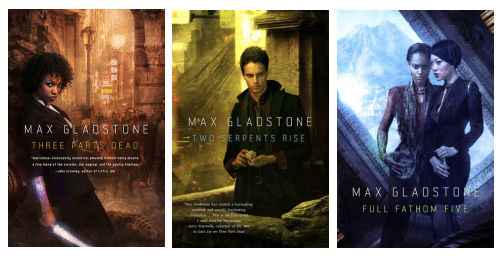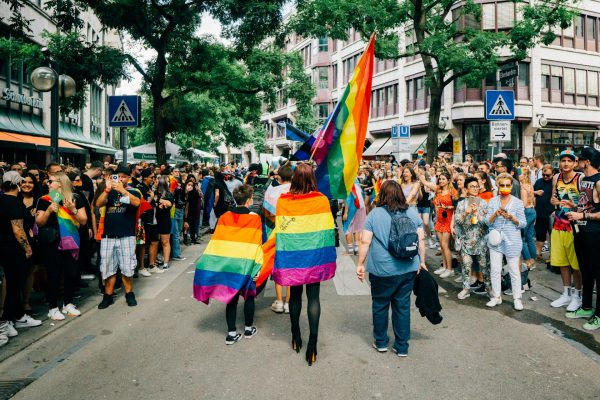Inclusive literature is somewhat hard to find. Books whose stories aren’t developed around, or have characters’ entire presence in the story hinge only on marginalization, are a rarity. If you can think of an example, it’s probably A Thing. It’s frustrating to see a character’s only personality trait being contingent on their oppression, remaining otherwise undeveloped. Sub-genre exist because of underrepresentation, or worse–misrepresentation. (In fiction, that often includes these characters as antagonists, the ‘bad guys.’)
Max Gladstone’s The Craft Series is a balm that soothes much of that frustration. The books discuss political, social, oppressive, and systemic problems. Non-fictional thinking points are presented through fiction. While the books themselves are fiction, the topics addressed are real. Oppression can be downright hard to absorb for someone who doesn’t experience it; fiction builds a bridge between these polarities. Sometimes, people don’t even realize they’re learning! That’s cool because not everyone learns the same.
Three Parts Dead, Gladstone’s first book, immediately starts with introducing the badass protagonist, a Woman of Color, when she falls from The Hidden Schools (semi-elitist and elusive institutions where one learns Craftwork, a kind of law-magic). Kicked out for unapologetic dissent against unethical professors, Tara Abernathy teams up with a Craftswoman from a well-distinguished firm, Elayne Kevarian, commissioned to address Concerns (part off that law-magic) from a dying God in Alt Columb. In Alt Columb, Gargoyles are the equivalent of an untouchable class, lowest of the low; they must sneak about because the extreme hatred towards them results in killings; they fought in the God Wars. But Alt Columb has got it all wrong. Tara befriends a Gargoyle hiding in a courtyard, knowing that she is supposed to resent and destroy them; the Gargoyle is ultimately the reason the God was revived. Cat, a cop by day and addict by night, is also pivotal in closing the contract–if only people hadn’t ignored what she had to say because of her addiction.
Three Parts Dead explores navigating male-dominated fields such as law; sexism in those fields; classism and the blind havoc it wreaks; and addiction.
The second book in the sequence is Two Serpents Rise. The story follows Caleb, Teo, and Mal. Caleb’s father is an abusive priest preaching blood sacrifice, and left Caleb with scars that his father believed to be holy. Teo is employed at Red King Consolidated with him. RKC is a water distribution firm, and water is becoming a scarce resource that can’t be rationed out equally to everyone. RKC plans on waking Dresediel Lex’s remaining Gods, sleeping in chains, to remedy this. Then the water is poisoned. Throughout the story, Caleb relentlessly pursues Mal–without telling the King in Red–as a suspect. Teo is constantly checking Caleb (and his privilege as a straight white man) when criminal pursuit quickly turns into romantic pursuit. Largely due to past experiences with abuse in their name, he is anti-God and anti-sacrifices. Mal turns out not to be. Her romantic interest began only as a strategy to find where the Gods of Dresedial Lex are kept so she could alert Caleb’s father, who has a perfectly timed blood-sacrifice planned, one that forces Caleb and Teo into assisting in order to stop it.
Two Serpents Rise touches on religion and its dangers, positives, and in-betweens; occupation; how childhood abuse shapes views in adulthood; water rights; and privilege. Another theme is the line where the desire for a person becomes an entitlement to possess a person;
Next in the series is Full Fathom Five, in which Kai is a trans woman employed by a private company that makes custom Idols, constructing them in a bottomless pool. Idols are used in place of Gods, which are scarce on Kavakanai’i. Employees are aware that Idols are not sentient. Still, Kai jumps in after an Idol, having seen its look of pain and fear. She wakes up hospitalized and badly injured. Elsewhere on Kavakanai’i, a group of homeless children grieve another God’s death, wondering why new Gods appear so abruptly–and die so soon after. Issa, one of these children, is old enough to be put in a Penitent if caught for vagrancy. She strikes a deal with Cat, whom she found withdrawing on the floor of her hideout, for passage off the island. Collective abilities of a distraught poet, Cat, and Issa both confirmed Kai’s suspicions: Gods are being killed to create the Idols. A lawsuit is filed against Kai under the ruse of recklessly endangering the company and Elayne Kevarian is summoned as one party’s lawyer. She, too, must be convinced, for her extensive knowledge of law and loopholes can help destroy the pool and the CEO.
Full Fathom Five discusses the criminalization of the homeless, specifically youth homelessness; cruel and unusual punishment; and disability. Other prevailing themes are gaslighting within legal systems, grief, and bioethics.
Gladstone’s fourth book, Last First Snow, is second chronologically. Snow focuses on capitalism; including gentrification, class privilege, social movements, and the marginalization of impoverished people. Temoc, Caleb’s father and Mina’s husband, is the unofficial priest of the Skittersill neighborhoods. Each morning he performs a mimic blood sacrifice to keep Gods satiated without death, and then returns to his family. People of the Skittersill are working- and lower-class but happy. In Chakal Square, a protest is growing: RKC plans on gentrifying the Skittersill. While RKC sees gentrification as a means to alleviate impoverished conditions, the firm does not realize that expensive properties and condos would push the people of Skittersill out of their homes and jobs, rendering them unable to live in their renovated neighborhood. Elayne Kevarian convinces RKC to compromise and hear out Skittersill residents. All goes well until an RKC representative gets zealous and everything crumbles into anger. Anonymous tabloids encourage violence. When Temoc’s friend Chel appears at his door bleeding, Mina stitches her wounds, but when Chel says the wellbeing of the Skittersill relies on Temoc, he refuses. Still, Temoc accepts this truth, but not before giving Caleb Godly scars. With Caleb bloody and drugged asleep, he runs.






